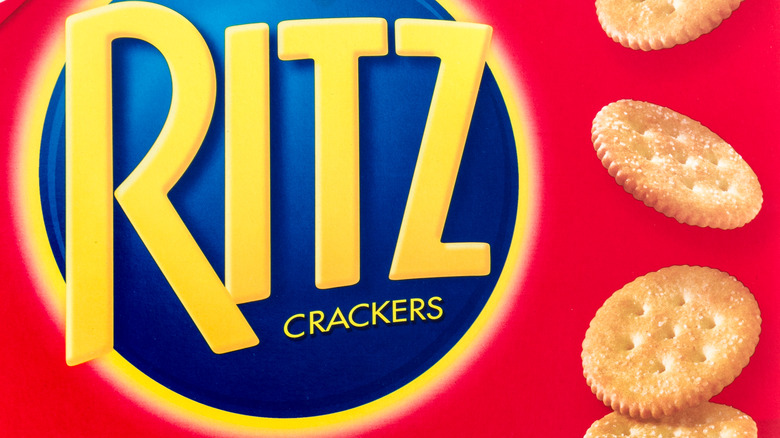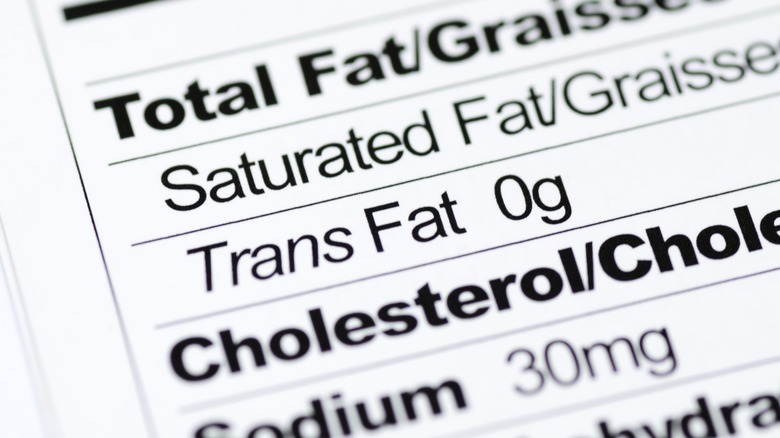The Surprising Reason Ritz Crackers Are Banned In Other Countries
If you're a snack lover, Ritz crackers might be at the top of your list. These versatile crackers are great for dipping into hummus or guacamole, topping with cheese or deli meat, or popping in your mouth just as they are.
These salty crackers have been popular since Nabisco launched them in 1934. Ritz is the third-leading cracker brand in the United States, generating $485.6 million in sales in 2017, according to Statista.
Ritz crackers are easy to get your hands on, too, whether you're shopping at the supermarket or in the grocery aisles of big-box stores. So it may come as a surprise that if you visit certain countries and head to the snack aisle, you won't be able to find Ritz crackers on the store shelves. It turns out, some countries don't allow Ritz crackers to be sold because of the crackers' ingredients list and how they're made.
Trans fat is the culprit
The ingredient in question is partially hydrogenated cottonseed oil, a type of trans fat that's regulated in many European countries. According to a May 2018 report from the World Health Organization, Austria, Denmark, Hungary, Iceland, and Norway "have set best practice mandatory limits of industrially-produced trans fat that apply to all foods." The report also notes that Switzerland "has a limit in fats/oils only."
Trans fats are created during the refinement process of vegetable oils that turn them into a colorless and non-odor producing oil, according to a May 2015 report from the Environmental Working Group. "The processed food industry considers refining essential to 'improve' the oils' 'sensory value' and to make the oils more versatile and interchangeable," notes the EWG. Many food companies use hydrogenated oils because they increase shelf life, explains NPR.
According to the University of California, Davis, trans fats increase low-density lipoproteins (LDL), a type of cholesterol that can build up in the bloodstream and block arteries. It can also increase the possibility of cardiovascular disease, such as heart attacks, per the FDA. In 2015, the FDA determined that many partially hydrogenated oils, also known as PHOs, are not safe to consume. "Removing PHOs from processed foods could prevent thousands of heart attacks and deaths each year," the FDA wrote. The original-flavor Ritz crackers' ingredient list doesn't include partially hydrogenated oils, but the Ritz Bitz ingredients list still features "vegetable oil (soybean and/or canola and/or palm and/or partially hydrogenated cottonseed oil)."
Food manufacturers can mislead
You can't always rely on the nutrition label of your favorite snack food; there are loopholes that allow food manufacturers to state a food product has zero trans fat, even if it still contains it. If you're scratching your head as to how this is possible, it's because food products that have less than half a gram per serving of trans fat can be labeled as having zero, per the American Heart Association.
As the FDA states, "If a serving contains less than 0.5 gram, the content, when declared, must be expressed as '0 g.'" This provides a loophole that benefits food companies and potentially causes confusion for consumers.
Not only are these regulations misleading, but they can also be harmful to people who may not pay attention to serving sized or who eat various foods that claim to have zero trans fats. They could be consuming a lot of trans fat unknowingly. "Trans fat is ubiquitous in the food supply, thanks to decades of lax regulations, and it's dangerous," stated the Environmental Working Group.


